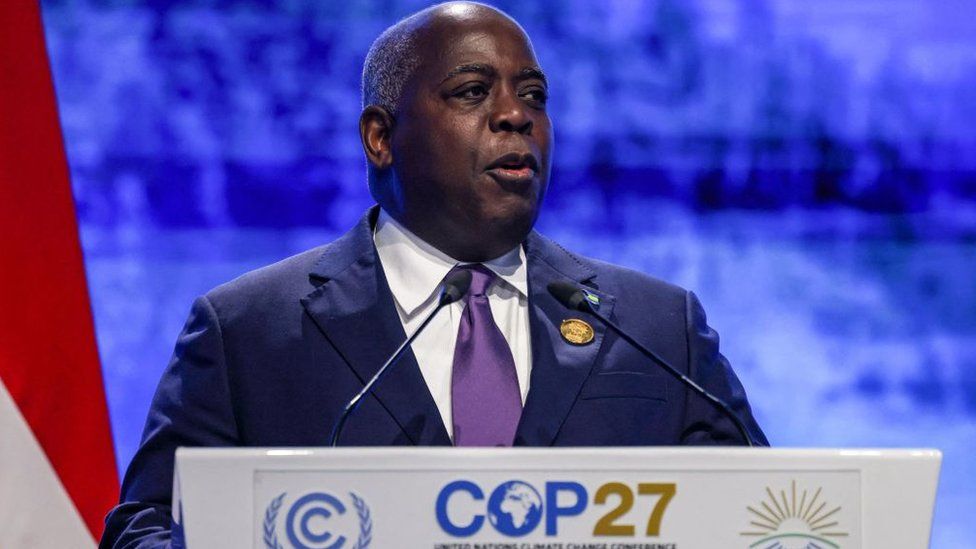ARTICLE AD BOX
 Image source, Getty Images
Image source, Getty Images
Bahamas Prime Minister Philip Davies told leaders to "get real"
By Georgina Rannard
Climate and science reporter, BBC News
Leaders of countries flooded or parched due to climate change are pleading at the COP27 summit for an urgent financial lifeline from richer nations.
"We will not give up... the alternative consigns us to a watery grave," Bahamas Prime Minister Philip Davies said.
Countries are meeting in Sharm el-Sheikh, Egypt to discuss next steps in curbing climate change.
Front line nations want a special compensation fund for the climate impacts they cannot recover from.
"I'm not here to ask any of you to love the people of my country with the same passion as I do," Mr Davies told leaders.
"I'm asking what is it worth to you to have millions of climate refugees to turn into tens of millions, putting pressure on political and economic systems around the world," he said.
As a low-lying nation, the Bahamas is particularly vulnerable to sea-level rise and storm damage.
He urged nations to "get real", saying that acting on climate change is in everyone's self-interest.
Image source, Getty Images
Referring to the trans-Atlantic slave trade that saw European countries buy and transport African people to the Caribbean against their will, Mr Davies said: "We are children of survivors of that man-made tragedy. We have a duty to fight for survival as they fought so desperately for theirs."
Leaders of African nations also called for support. Ghana President Nana Akufo-Addo said the continent needs money to adapt to climate change. "No-one will win if Africa loses," he said.
And Namibian President Hage Geingob called developed countries "criminal" for their role as the biggest historical emitters of greenhouse gases (those gases that warm our atmosphere).
Nations very vulnerable to climate change are united in their calls at the summit for richer countries to pay the bill for the damage caused by sea level rise, drought and extreme storms.
They say developed nations owe this money because they became rich off decades of using fossil fuels.
By contrast many less developed countries, particularly the small island nations most at risk, have contributed virtually nothing to total emissions.
Richer nations have historically avoided the question of compensation or reparations, but the issue - referred to as "loss and damage" - was put on the COP agenda this year for the first time since the summits began 30 years ago.
The Alliance of Small Island States (AOSIS), a group of low-lying countries, suggested that fossil fuel companies "could carry a portion of their burden" by paying a tax on profits.
"We all know they make extortionate profits," Prime Minister of Antigua and Barbuda Gaston Browne told journalists at COP.
Countries including China and India should help contribute to the fund, he said, but added that AOSIS will not push for retrospective cash.
The Pacific island nations of Tuvalu and Vanuatu called for a treaty to end the use of fossil fuels.
"The climate emergency can be reduced to two basic concepts - time and temperature. It's getting too hot and there is barely time to slow and reverse it," Tuvalu Prime Minister Kausea Natano said.
Image source, Getty Images
Image caption,Catastrophic flooding put a third of Pakistan under water
And speaking weeks after floods devastated Pakistan, killing more than 1,700 people, Prime Minister Shehbaz Sharif said countries are "trapped in a crisis of public financing fuelled by debt and yet have to fund climate disasters on their own. This is simply unjust and unfair to say the least."
President of the European Commission Ursula Von Der Leyen acknowledged that richer nations should do their part, telling COP27: "Those most in need, in the developing world, must be supported in adapting to a harsher climate [...] COP must make progress on averting, minimising and addressing loss and damage from climate change."
It is the third day of the COP summit, which is focussed on implementing ambitious promises made at COP26 in Glasgow last year.
Away from the negotiations, the sister of jailed Egyptian-British pro-democracy activist Alaa Abdel Fattah said she does not know if he is alive as the UN called for his immediate release.
On Monday leaders of richer nations said countries should stay the course in tackling climate change despite the war in Ukraine and global energy shocks.
UK Prime Minister Rishi Sunak said it is a reason to act faster, promising to develop clean energy that would bring energy security.
In a reminder of the danger the world faces, UN Secretary General Antonio Guterres told the summit "we are on a highway to climate hell with our foot on the accelerator".
Additional reporting by Esme Stallard and Peter Okwoche.
The COP27 global climate summit in Egypt is seen as crucial if climate change is to be brought under control. More than 200 countries are attending the summit to discuss further measures to cut emissions and prepare for climate change, and it could lead to major changes to our everyday lives.

 2 years ago
41
2 years ago
41








 English (US) ·
English (US) ·